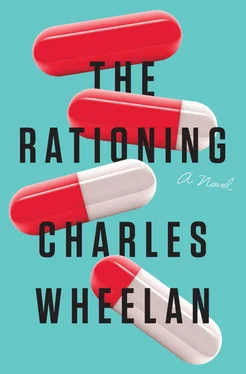“That’s his shtick,” the Strategist said.
The National Security Adviser continued, always addressing her comments to the President, “As you know, there is an ongoing corruption investigation in India into military contracting. Several ministers have resigned. The opposition has seized on the situation to go after the Prime Minister. He’s on the political ropes. This would be a great distraction for him.”
“Okay, where else? What are our other Dormigen options?” the President asked.
“We need to discuss China, sir,” the National Security Adviser said.
“Not yet,” the President said. “I want to know what our other options are.”
“We’ve hit a wall,” the Chief of Staff said. “There are a few more loose commitments, but in terms of Dormigen shipments, there aren’t any more big ones to report. We’re about where we were yesterday.”
“How about Latvia?” the Strategist asked, deadpan.
“Latvia shipped us seven hundred fifty doses,” the Chief of Staff answered, trying to suppress her annoyance.
“I don’t understand,” the Speaker of the House said. “We’re looking at a massive epidemic and we can’t get our allies to loan us a week’s worth of Dormigen? Have we pointed out to them that we invented the drug in the first place? If it weren’t for us—”
The President interrupted, “Look, I’ve made fifty phone calls in the last few days. It’s hard to get any responsible leader to ship a meaningful quantity of a lifesaving drug out of the country, especially with the Capellaviridae epidemic out there.”
“Most of these countries are not seriously affected by Capellaviridae ,” the NIH Director said.
“That could change tomorrow,” the President answered. “Then they go down in history as the leader who shipped their Dormigen to the U.S. just as a major epidemic hit. No politician wants to take that risk.”
“So they’re afraid of the politics?” the Speaker of the House asked. It was like she was wearing different glasses from the rest of us, with special lenses that saw only politics, wherever she looked.
“I don’t think you heard what the President was saying,” the Chief of Staff said. “I’ve listened in on a lot of the calls. They’re afraid of making a huge, deadly mistake.”
The National Security Adviser spoke up forcefully: “There’s one other thing, ma’am, if I may be frank here.”
“Of course,” the Chief of Staff said.
“There’s a lot of anger out there, a lot of pent-up frustration with the United States.”
“We invented Dormigen!” the Speaker interjected. “The United States is the only reason they have any Dormigen at all. Billions of dollars of American taxpayers’ money for all the research and development. What exactly are they frustrated about?”
“Well, Madam Speaker, they are frustrated by a lot of things,” the National Security Adviser responded. She turned slightly to face the Speaker and spoke in complete sentences, even when she was angry. “They are frustrated that we withdrew half of our funding for the United Nations. They are frustrated that we shut our borders to immigrants from Yemen and Syria and Turkey. They are frustrated that we are the richest country in the history of civilization, but we refuse to allow the world’s poorest countries to sell us their products.” The National Security Adviser paused for effect, and then finished her delicately crafted paragraph. “Those would be a few examples.”
She might as well have reached across the table and slapped the Speaker across the face. Even I—with a political knowledge gleaned mostly from the Internet while searching online for more interesting things—was aware that the Speaker had spearheaded all of the policies the National Security Adviser had ticked off, along with several others that could have made for a second paragraph. After Donald Trump’s political success with his “America First” agenda, opportunistic politicians across the political spectrum had rushed to create their own knockoffs, the policy equivalent of those fake handbags spread across the sidewalk in New York City. Who cares who designed the original product if people like it? The Speaker had asserted her leadership of the progressive wing of the Democratic Party in large part by dressing up the Trump agenda in left-wing clothing. She had argued, for example, that we could not help the poorest Americans if we were shipping “a huge chunk of our tax revenues” to corrupt countries overseas. She said it was unreasonable for Americans to make sacrifices to deal with climate change while “the most polluting countries in the world are doing nothing.” And so on. Her relations with the Tea Party were frigid but when it came to votes in the House, they often voted together, a new voting bloc of the populist left and right. The President had run for the White House in part to fight against this new isolationism. Like so much else he had done, the Speaker considered it a personal affront and a political assault.
“What about privatizing Dormigen production?” the Speaker asked defensively.
“Yes, that came up in a few of the conversations, but no one seems to care why we have a shortage,” the Chief of Staff answered, somewhat ruefully. She looked at the President. “Do you remember what Cedrek told us?”
“The French President,” the National Security Adviser interjected for the benefit of the rest of us.
“No, I don’t remember,” the President said.
The Chief of Staff continued, “He said—I even wrote it down…” She flipped through a legal pad and then continued, reading from her notes: “ ‘The Americans have been stealing our lunch money for fifty years and now you come asking to borrow some change.’”
“Stealing their lunch money?” the Speaker said incredulously. “That has no basis in reality. Half these countries have been free-riding off of our military for the last century. South Korea? Please tell me that South Korea has shipped us Dormigen.”
“South Korea has been very generous,” the Chief of Staff said.
“They should be, given all we’ve done for them,” the Speaker declared.
“I’ll mention that to them,” the President replied.
The National Security Adviser said calmly, “With all due respect, Madam Speaker, many of these countries perceive that the United States has been insensitive to their needs, especially in recent years. Whatever the objective reality, their perception is what matters here. You are welcome to tell them they should feel more grateful, but I suspect that will just make the problem worse.”
“What about killing them with kindness?” the Senate Majority Leader said. He had been largely silent since our early meetings. In the Cabinet Room, he sat with his jacket buttoned, his huge paunch creating what looked like an Olympic ski jump onto the table. But now his inner LBJ had been activated. “Everybody is willing to make some kind of deal, if we sweeten it enough.”
“I’m not sure that’s true in this case,” the Chief of Staff said. “This is more about national pride.”
“It could actually make things worse,” the National Security Adviser added. “If a leader is seen as taking a big payoff from the U.S., and then they come up short on Dormigen in their own country, even just a few deaths, it would be a political nightmare. Why take the risk?”
“Maybe we make them a deal they can’t refuse,” the Senate Majority Leader said. “These countries don’t really want to be on the wrong side of the United States.” The room was silent as the participants around the table absorbed the Majority Leader’s thought. He continued. “They’ve got a surplus of Dormigen—”
“Maybe they have a surplus,” the Acting HHS Secretary interrupted. “They can’t be sure exactly what they will need.”
Читать дальше












